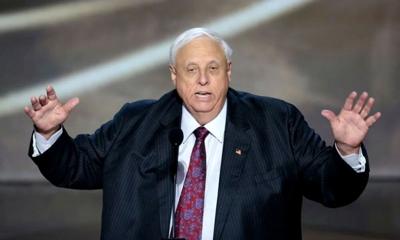
Sen. Jim Justice (R-W.Va.)
NASHVILLE – U.S. Senator Jim Justice has been hit with a $30 million federal verdict regarding unpaid premiums and collateral owed on surety bonds issued to various Justice-owned coal mining businesses.
In an October 30 ruling, U.S. District Judge Waverly D. Crenshaw Jr. said Justice (R-W.Va.) is liable for breaching an agreement and guaranty with Lexon Insurance Company. Crenshaw awarded Lexon more than $25 million in principal as well as almost $4 million in pre-judgment interest and post-judgment interest at 3.57% compounded annually.
Lexon, which is based in Mt. Juliet, Tennessee, accused Justice of breach of contract after it issued more than $20 million in bonds to Justice’s various coal mining businesses over several years.
Lexon says the Justice companies stopped making required premium and collateral payments in 2021. It said Justice has personally guaranteed the payments.
In December, the court entered an order granting summary judgment to Lexon on all claims, and the trial on damages took place August 30-31.
In a press release from one of the law firms that represented Lexon, it says Justice made an unsuccessful “11th-hour attempt … to postpone the trial.”
Nashville-based Bass, Berry & Sims partnered with Houston-based Vinson & Elkins to secure the verdict.
“Complex contract disputes of this type always present a challenge for trial, regardless of whether you are presenting the case to the judge or a jury,” attorney Brant Phillips said in the release. “Judge Crenshaw’s careful attention to the details was apparent, and his decision reaffirms that the law should apply equally to everyone no matter how high-ranking the person on one side of the case may be.”
The Justice companies in the complaint are James C. Justice Companies Inc., Southern Coal Corporation, Kentucky Fuel Corporation, Justice Family Group LLC and Mechel Bluestone Inc.
In Crenshaw’s 45-page ruling, he says the parties have differing definitions of “total indebtedness.” But the judge says “the term ‘total indebtedness’ in unambiguous.”
Various agreements amended the obligations, increasing collateral to $20 million and monthly premium payments to resolve past due and ongoing obligations. Crenshaw found Justice failed to make required premium and collateral payments as outlined in the amended agreement and personal guaranty.
The parties disputed whether obligations ended on set dates or continued until Lexon was paid in full. Crenshaw ruled the agreements and Justice’s personal guaranty clearly state obligations continue until payment and satisfaction “in full of all of the obligations.” Therefore, additional unpaid and overdue premiums continue to accrue and are included in the total damages.
“Given that one of the explicit purposes of the Amended Agreement was to ensure that the obligors (Justice) paid all of their debts to Lexon with respect to their premium payments, it makes little sense to interpret Total Indebtedness in the Amended Agreement as capping that liability, as Senator Justice suggests,” Crenshaw wrote. “Rather, it makes much more sense, reading the recitals with the other terms in the Amended Agreement, to interpret the meaning of Total Indebtedness to include the sum of premium payments overdue by the obligors to Lexon (that could continue to grow, depending on the obligors’ noncompliance with future payments).”
Crenshaw also calls the testimony of Stephen Ball, executive vice president and in-house counsel for the Justice Companies, not credible. He says Ball admitted at trial that it was Jay Justice, the senator’s son, who negotiated the terms of the agreement. Jay Justice was not called to testify at trial.
“This alone makes Ball’s testimony on the true meaning of the terms of the Amended Agreement less relevant or reliable than (Brian) Beggs’ and (Jerry) Sentman’s (two Lexon officials) testimony, given they both had direct knowledge of the Amended Agreement and Guaranty negotiations” Crenshaw wrote. “Second, Ball’s personal ties and investment in the obligors’ and Senator Justice’s success makes his testimony less credible.
“Notably, Ball started working for the Justices more than twenty years ago when he first graduated from law school. He has been employed by Senator Justice’s family ever since. His personal relationship is obvious, as is his bias. …
“Ball’s ties to Senator Justice and the obligors extend far beyond those of the average employee to their employer.”
Crenshaw goes on to say Ball’s bias also is evidenced by his testimony that total indebtedness constituted a fixed amount was in direct conflict with his prior deposition in which he said past-due premiums got added to the definition of new indebtedness.
“These inconsistencies in Ball’s testimony cannot be ignored,” Crenshaw wrote. “At bottom, the court does not find Ball’s inconsistent, uninformed, and biased testimony about the definition of Total Indebtedness to be credible.
“Because of this, and the overwhelming evidence calling for a different interpretation of Total Indebtedness than that Ball and Senator Justice assert, the court gives his testimony little weight.”
In addition to Ball, Justice was represented by Carey Douglas Kessler & Ruby in Charleston and by Lewis Thomason in Nashville.
U.S. District Court for the Middle District of Tennessee case number 3:23-cv-00772





